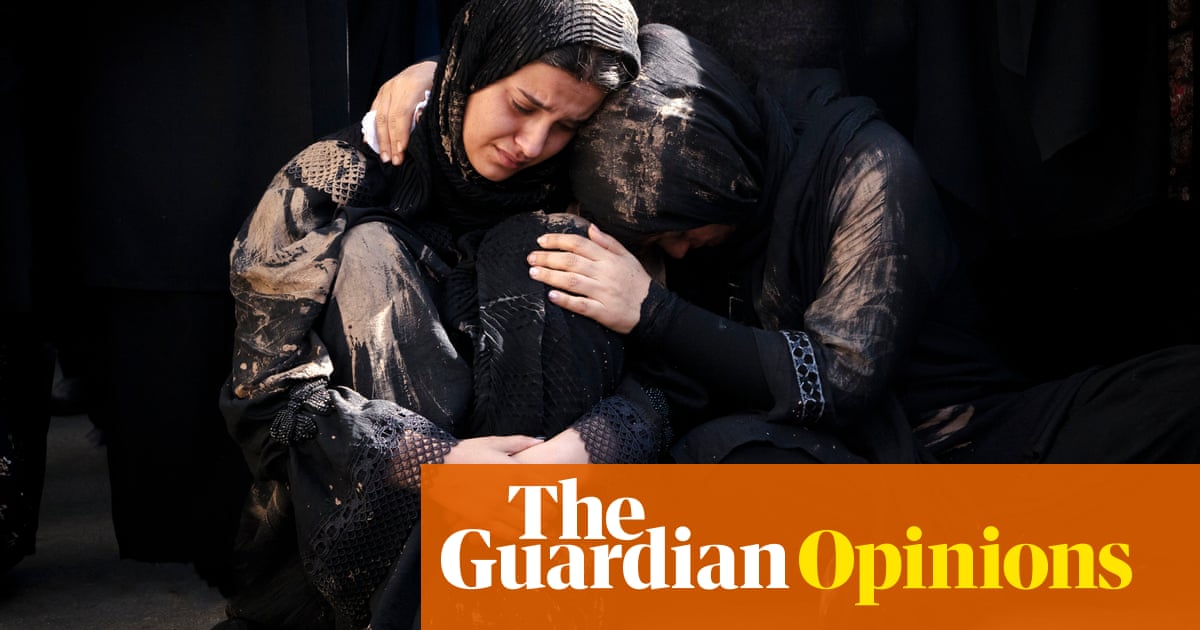The Israeli prime minister, Benjamin Netanyahu, has invoked the Iranian regime’s heinous women’s rights record to justify his heinous war on Iran. This is the man whose genocide of Palestinians in Gazakilled more women and childrenin its first year than the equivalent period of any other conflict over the past two decades.
“They’ve impoverished you, they’ve given you misery, they’ve given you death, they’ve given you terror, they shoot down your women, leaving this brave, unbelievable woman, Mahsa Amini, to bleed on the sidewalk for not covering her hair,” hetold Iraniansin an interview with Iran International.
It is incredible to hear Netanyahu call on the Iranian people to rise up against the very things he has subjected Palestinians to. But it is not surprising. I am all too familiar with the ways imperialists, occupiers and invaders weaponise Muslim women’s bodies and rights to justify their wars.
As an Egyptian, I know that colonisers such as Evelyn Baring, the 1st Earl of Cromer and the de facto ruler of Egypt between 1883 and 1907, supported greater rights for Egyptian women while being an anti-suffragist back home. Far from emancipating Egyptian women, Baring made it almost impossible for those opposed to the occupation and European influence to criticise traditions or religious practices without looking as though they were taking the side of the west.
As a woman of Muslim descent, I remember vividly the US claiming its invasion of Afghanistan was to “liberate” women from the Taliban’s misogyny. Twenty years after that reckless invasion, an increasingly disastrous war and occupation, and a criminally chaoticwithdrawal from Afghanistan, the Taliban once again rule.
Even worse and more shamefully, as a feminist I know that, unlike Afghan feminists, white feminists in the US were cheerleaders of that invasion, failing to understand the dangers of imperial powers co-opting women’s rights. Leaders of the Feminist Majority Foundation – including Eleanor Smeal, the former head of the National Organization for Women – attended events at the state department and met administration officials. The spring 2002 issue of Ms magazine called the invasion a “coalition of hope”.
“As we achieve our objective, we are also clearing the path for you to achieve your freedom,”said Netanyahuin another televised speech aimed at Iranians. “This is your opportunity to stand up and let your voices be heard. Woman, life, freedom – zan, zendegi, azadi.”
Thedeath of Mahsa Amini, a 22-year-old Kurdish woman, in a hospital in Iran in September 2022 days after being detained by the regime’s “morality police” for allegedly not complying with the country’s hijab regulation, sparked the feminist “woman, life, freedom” revolution. Women, queer people and marginalised minorities in Iran rose up to fight not only the regime’s compulsory hijab law but its decades of repression.
They did not need Netanyahu to fight for their freedom then, nor do they need him now. On the contrary, his attempt to co-opt the courageous uprising is the quickest way to discredit feminism itself – often dismissed as “western” and alien. Wars and invasions harm, not strengthen, revolutions. As an Egyptian, I know all too well that the Egyptian regime tried its hardest to claim our25 January revolutionin 2011 was being masterminded from abroad.
Protecting the “liberal” and “western” values of women’s rights is an easy moral cover for what is an invasion, war or colonisation always motivated by a desire for power, resources or both. If western leaders really cared so much about female bodily autonomy, perhaps they could look closer to home. The same George W Bush who claimed to defend women from the burqa and the Taliban was the same George W Bush who, on his first day in office, cut off funding to any international family-planning organisations that offered abortion services or counselling.
Would the white feminists call for the invasion of the US today, where a premature baby was extracted from the decaying body of a brain-dead Black woman who, against the wishes of her partner and family, wastreated like an incubatorbecause of the state of Georgia’s ban on abortion? The patriarchy-atop-theocracy melange of Iran’s “morality police” is easier to see because it is so visibly expressed in the enforced hijab. But what is the enforced pregnancy of the Christian zealots in the US but a melange of patriarchy built atop theocracy right there?
Wars and invasions do not liberate women. Ask the women of Afghanistan today. Every time an imperial power claims to “liberate” women from “their” men, those men will seek to wrestle back control over “their women” when the invaders are gone. Taliban 2.0 have banned girls’ education and barred women from working in public and private sectors, except for Afghan healthcare and a few other departments. They have barred women from travelling long distances by road or air unless accompanied by a male relative, and from visiting public places such as parks, gyms and bathhouses without a male relative. The Taliban have shut down even women-only beauty salons.
As a feminist, I marvelled at and cheered on fellow feminists in Iran rising up for woman, life, freedom. And I am sure they know that the enemy of their enemy is not their friend.
Mona Eltahawy writes theFeminist Giantnewsletter. She is the author of The Seven Necessary Sins for Women and Girls and Headscarves and Hymens: Why the Middle East Needs a Sexual Revolution
Do you have an opinion on the issues raised in this article? If you would like to submit a response of up to 300 words by email to be considered for publication in ourletterssection, pleaseclick here.
